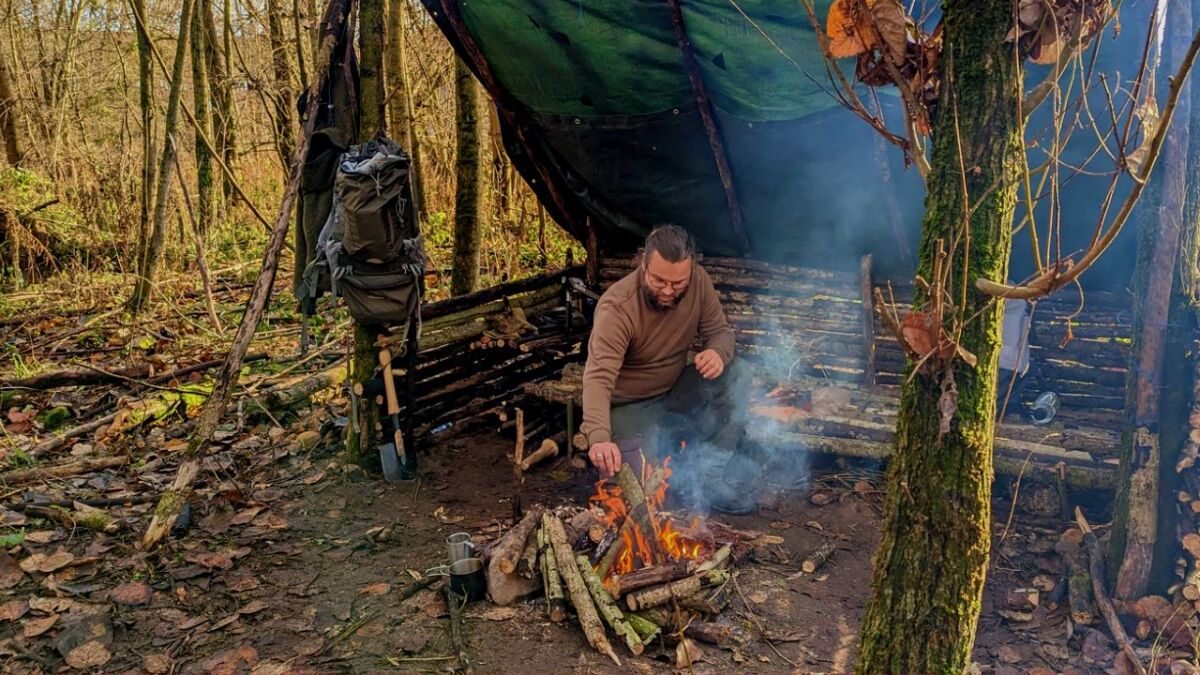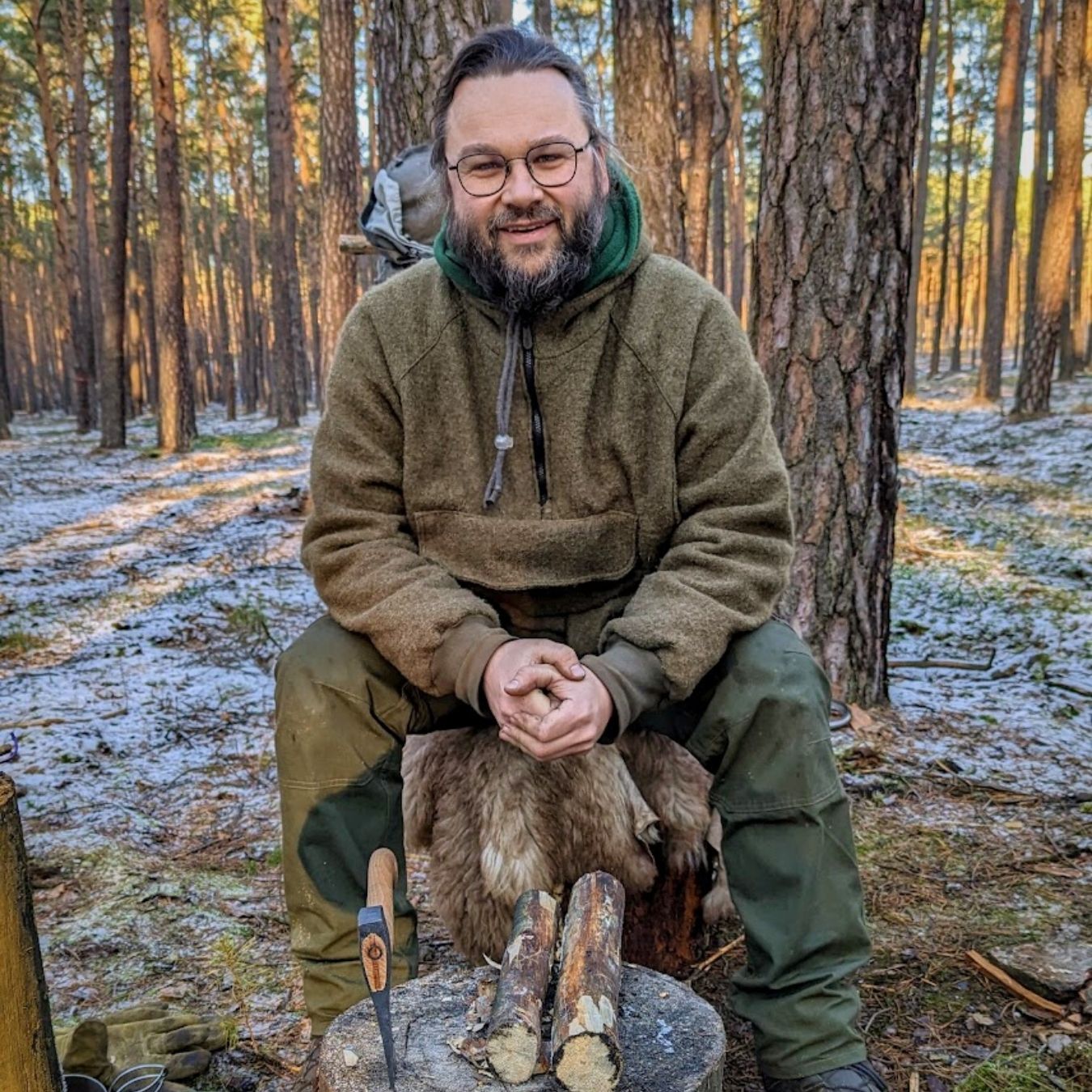
Bushcraft training
Noun
Meaning
Bushcraft training refers to the process of acquiring and honing the skills necessary for survival and self-reliance in the wilderness. It encompasses a wide range of practical skills and knowledge, including fire-making, shelter-building, foraging, navigation, and tool-making. Bushcraft training is essential for anyone venturing into the outdoors, whether it be for camping, hiking, or other wilderness activities. It empowers individuals to adapt and thrive in natural environments, fostering a deeper connection with nature and a greater sense of self-sufficiency. By learning and practicing bushcraft skills, one can gain the confidence and competence needed to navigate and survive in the wild.

Examples
„I've been really interested in learning bushcraft skills lately.“
„I signed up for a bushcraft training course to improve my survival skills in the wilderness.“
„During the bushcraft training, we learned how to build a shelter using natural materials.“
„The instructor taught us essential bushcraft skills like fire-making and foraging for food.“
„After completing the bushcraft training, I feel more confident in my ability to survive in the wild.“
Origin
The word "Bushcraft" originated from the combination of two words: "bush" and "craft". The term "bush" refers to the wilderness or the natural environment, while "craft" refers to a skill or ability. Bushcraft training, therefore, refers to the development and honing of skills and knowledge necessary for survival and thriving in the wilderness.
Bushcraft training has its roots in ancient human history, where our ancestors relied on their knowledge of the natural world to survive. It draws inspiration from indigenous cultures and their traditional ways of living in harmony with nature. Over time, these skills and techniques have been passed down through generations, evolving and adapting to different environments and circumstances.
In recent years, bushcraft training has gained popularity as a recreational activity and a way to reconnect with nature. It encompasses a wide range of skills, including fire-making, shelter-building, foraging, navigation, and wilderness first aid. Bushcraft training also emphasizes the importance of understanding and respecting the natural environment, promoting sustainable practices and minimal impact on the wilderness.
Today, bushcraft training is not only a means of survival but also a way to develop self-reliance, resilience, and a deeper connection with the natural world. It offers individuals the opportunity to learn and practice essential skills that can be applied in various outdoor settings, from camping trips to emergency situations.
Synonyms
Wilderness skills, Survival training, Outdoor skills, Primitive living, Nature craft, Woodcraft, Backcountry skills, Primitive skills
Antonyms
Urban living, Technology dependence, Lack of self-sufficiency, Disconnection from nature, Reliance on convenience, Ignorance of survival skills, Vulnerability, Unpreparedness
Relatives
Wilderness survival, Outdoor skills, Primitive living, Nature skills, Survival techniques, Survival training, Primitive technology, Wilderness living
Historical and cultural importance
Bushcraft training has a rich historical and cultural significance that dates back to ancient times. It encompasses the knowledge and skills required to survive and thrive in the wilderness, relying on the resources provided by nature.
Historically, indigenous cultures around the world have practiced bushcraft as a way of life. They developed intricate knowledge of their local environments, mastering techniques for hunting, gathering, shelter-building, and fire-making. These skills were passed down through generations, ensuring the survival and resilience of their communities.
In more recent history, bushcraft training gained popularity among explorers, adventurers, and military personnel. During World War II, for example, soldiers were trained in bushcraft skills to enhance their survival chances in hostile environments. This training included navigation, camouflage, foraging, and basic medical skills.
Today, bushcraft training has evolved into a recreational pursuit and a means of reconnecting with nature. It offers individuals the opportunity to learn essential skills such as fire-making, shelter-building, water purification, and plant identification. It also promotes self-reliance, resilience, and a deeper understanding of the natural world.
Furthermore, bushcraft training has become an integral part of the survival and prepping communities. It provides individuals with the knowledge and confidence to face unexpected situations and emergencies, whether in the wilderness or during urban disasters.
Overall, bushcraft training holds historical and cultural significance as a way of life for indigenous cultures and as a valuable skill set for modern-day adventurers and survivalists. It embodies the spirit of self-sufficiency, resourcefulness, and respect for nature.
More information about the term Bushcraft training
Bushcraft Training: Mastering the Art of Wilderness Survival
Bushcraft training is the key to mastering the art of wilderness survival. It equips you with the skills and knowledge needed to thrive in the great outdoors, relying on your resourcefulness and connection with nature. Whether you're an avid adventurer or simply want to be prepared for any situation, bushcraft training is an invaluable investment.
Understanding Bushcraft
Bushcraft is all about living in harmony with nature, using the resources available in the wilderness to meet your basic needs. It encompasses a wide range of skills, including firecraft, shelter building, foraging, hunting, and navigation. Bushcraft training teaches you how to utilize these skills effectively, ensuring your survival and comfort in the wild.
Firecraft
Fire is one of the most essential elements in bushcraft. It provides warmth, light, and the ability to cook food. Bushcraft training teaches you various fire-starting techniques, such as using a flint and steel, friction fire methods like the bow drill or hand drill, and even how to start a fire in wet conditions. You'll also learn how to gather and prepare tinder, kindling, and firewood.
Shelter Building
Having a reliable shelter is crucial in the wilderness, protecting you from the elements and providing a safe haven. Bushcraft training teaches you how to construct different types of shelters using natural materials, such as debris huts, lean-tos, and tarp shelters. You'll learn how to choose the right location, build a sturdy structure, and insulate it for maximum comfort.
Foraging and Wild Edibles
Knowing how to identify and gather wild edibles is an essential skill in bushcraft. Training in foraging teaches you how to recognize edible plants, mushrooms, and berries, as well as how to avoid poisonous ones. You'll learn about seasonal availability, proper harvesting techniques, and how to prepare and cook wild foods.
Hunting and Trapping
While foraging can provide sustenance, hunting and trapping can supplement your food supply in the wilderness. Bushcraft training covers basic hunting techniques, such as tracking, stalking, and setting traps. You'll learn about animal behavior, identifying tracks and signs, and ethical hunting practices.
Navigation and Orienteering
Being able to navigate your way through the wilderness is crucial for survival. Bushcraft training teaches you how to use a compass, read maps, and navigate using natural landmarks. You'll also learn how to orient yourself without any tools, using the sun, stars, and other natural indicators.
Conclusion
Bushcraft training is an immersive experience that allows you to connect with nature on a deeper level. It empowers you with the skills and confidence to survive and thrive in the wilderness. Whether you're planning a camping trip, exploring remote areas, or simply want to be prepared for any situation, bushcraft training is an invaluable investment in your outdoor skills.
Back to overview

